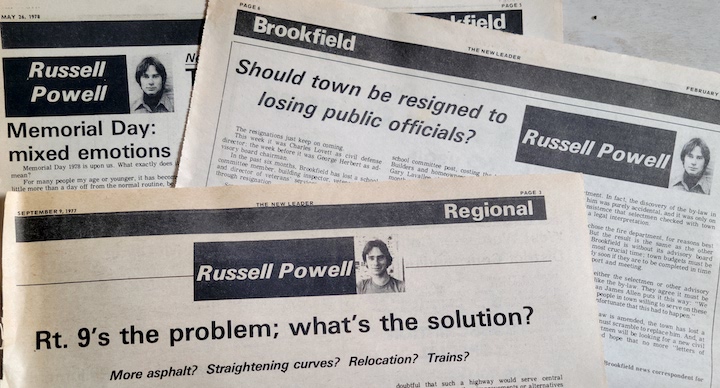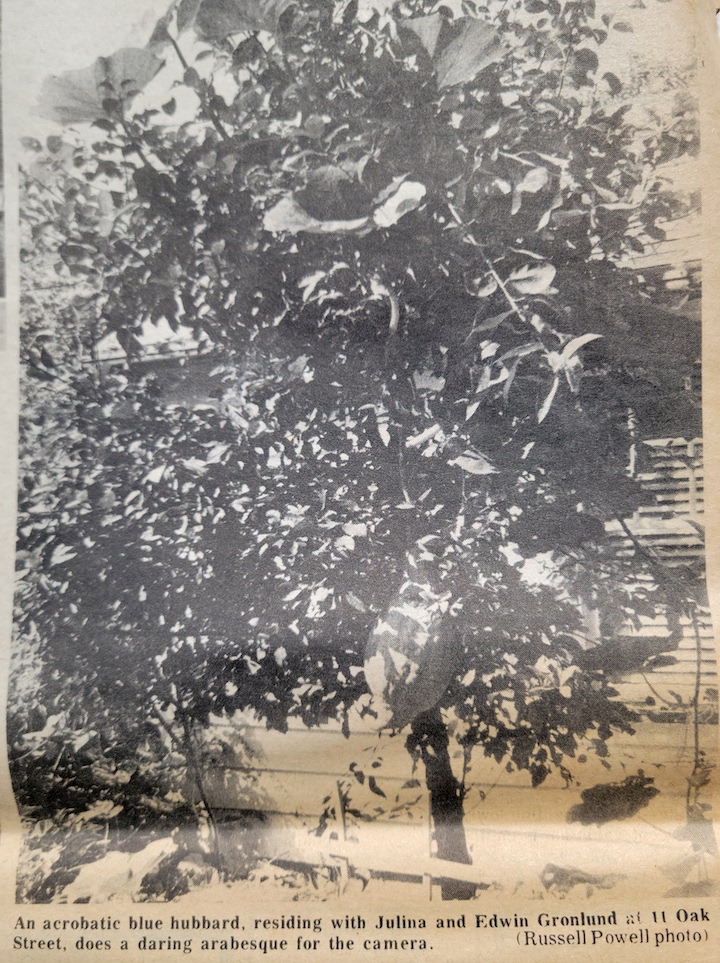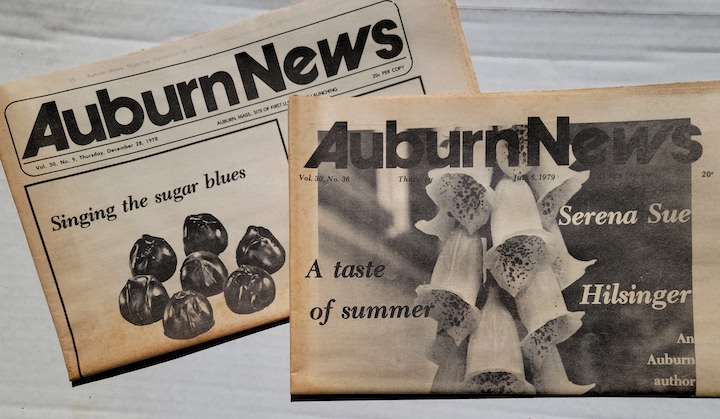My first full-time newspaper job, editor of the Auburn, Mass. News (1978-1980)
THE BAD THING about being a public artist is that the inevitable mistakes that come with experience and experimentation are there for all to see.
The good thing is that putting work on paper, canvas, or videotape leaves a tangible impression of events that would otherwise be forgotten.
I was reminded of this while going through some boxes of old writing, a hodgepodge of journals, short stories, (mostly bad) poetry, free-lance articles, term papers, and a novel (that today I can thankfully say was never published).
There was a stack of tabloid newspapers I had written for or edited more than 40 years ago: the Spencer, Mass., New Leader; the Auburn (Mass.) News; and Momentum, a weekly features magazine of the Valley News in West Lebanon, New Hampshire. Of course, I knew about these, but I was astonished at how much I had forgotten between the pages.
* * *
MY JOURNALISM CAREER had an inauspicious debut. An English major in college, I left Brandeis after my junior year to get married at the ripe old age of 21. I was clueless about a career, and not about to sully my creative writing aspirations by stooping to be a journalist.
After 14 months of rattling around in old trucks as a door-to-door milkman for Greenwood Dairy in Worcester, though, journalism began to look pretty good.
My first job was part-time correspondent for the town of Brookfield for the daily Worcester Telegram. I received no bylines; my work consisted mostly of attending weekly selectboard meetings and reading my notes to a reporter in the Spencer office, who turned them into a story. After several months I switched to the weekly New Leader to have greater opportunities to write.
The New Leader was one of several weeklies and one daily newspaper (the flagship Southbridge Evening News) owned by Loren Ghiglione (who later directed journalism programs at the University of Southern California and Northwestern).

In addition to covering Brookfield’s municipal government for the New Leader, I was encouraged to write feature stories and an occasional column in which I could express my opinions on a wide range of subjects.
I had forgotten the serious issues I had written about, from civic participation to Memorial Day (even vegetarianism) at such a young age.
I interviewed then-Governor Michael Dukakis, and my cousin, dancer Jim May. My favorite headline: “Bleeding the Benevolent Behemoth,” about plans for allocating state funds.
Eventually I cobbled together a full-time job between my growing editorial duties and the camera and composing rooms in Southbridge, where the company’s printing press was located. This diverse training was invaluable.
* * *
I HAD JUST EDITED my first publication, a simple high school graduation supplement comprising page after page of thumbnail-sized headshots. It was a step up in responsibility, but there was little for me to do except to get the names right and not leave anyone out.
That same week the editor of the Auburn News abruptly resigned. I never knew if she left for personal or professional reasons, but with a paper due in a matter of days there was no time to conduct a proper search for her replacement.
I was in the right place at the right time: eager, available, and cheap. I was named editor nearly on the spot — with less than a week to plan, edit, and design the next issue. I was thrilled at the chance, but didn’t eat for days.
I drove to my new office and introduced myself to the paper’s holdover staff: a secretary and ad sales rep. I met the paper’s several part-time reporters, all new to me and of varying talent.
Not only had I never produced a newspaper, I had scant knowledge of Auburn, a 40-minute drive away. I sat behind a desk in a quiet office, not a lively newsroom; there were no colleagues around to bounce ideas off.
Production was decentralized. A courier delivered edited copy to Southbridge to be typeset. Artwork and page layouts went to a composing room in Webster, several towns away, and the newspaper was printed in Southbridge. I didn’t see the pages after my layouts left for Webster until printed copies arrived in Auburn the following day.
Somehow that first paper got out on time. It was harrowing, but I loved it. I grabbed every publication I could find that week and sat up late at night poring over each one, and I took advice from a friend with journalism experience. I carry with me to this day many of the lessons I learned during my two years in Auburn, including not just editing but photography, layout, and design.
Those professional skills, I suppose, are what truly matter. Still, my memory works in curious ways.
I found a photograph of mine about which I have no memory whatsoever, of a large, Blue Hubbard squash dangling from a tree. It was a truly strange sight — the vines having snaked into the tree and produced this weighty squash several feet above the ground — yet not enough to make a lasting impression.
* * *
MOST OF THE OLD NEWSPAPERS were not worth saving; I tossed all but a few. Seeing these relics of my past, though, has unleashed a flood of memories. More is there, perhaps, than I realize; I simply haven’t had to access it for years.
But what if I hadn’t saved and finally exhumed this fading newsprint? Would this seminal time in my professional life been reduced to a few empty lines on a résumé?
This reminiscence serves as a reminder, not just of the vagaries of memory, but of how little we know about each other’s life stories. Friends old and new, former colleagues and classmates, children and grandchildren know little or nothing of my journalistic past. I hope this is of interest.
I still write, yet I am primarily a painter now. My newspaper days are long gone and practically forgotten. But I wouldn’t be who I am today without them.



I remember your newspaper days, Russell. We were all young and willing to do just about anything to get in on the ground floor. I was a paste-up artist working out at the boards at the Shore Line Times in Guilford, CT during the era you described. Eventually I had an opportunity to become a proofreader and eventually wrote some obituaries.
Going through those boxes of newspaper clippings and early writing is a private and quiet experience. I am doing exactly the same thing. Thank you for sharing this reflection with us.
So much in the attic, real and metaphorical! I remember fondly those early days working on the paper at Nasson. I hope you are enjoying your own discoveries.
Thanks Russell for an interesting reflection on the “good old days” of newspaper journalism and local news coverage. Alas, the sun probably has set for many of the papers you worked for. I wonder how many still exist?
Good question, Rob! I fear most of this community news is gone, as our local dailies get smaller and smaller. They provide such a valuable service, and no one else is there to pick up the slack. Support your local newspaper!! Thanks for the comment.
Russell,
You may not remember much of your early journalism in western Mass, but I remember — and remember admiring — your fine writing on arts and culture for the Valley News.
Thanks so much, Jim–a great reader, and writer, in your own right. Glad that you remember those days!
Thanks, Russell, for these reminiscences. I loved reading them and learning about the early years of your career, of which I knew nothing. I’d love to learn more.
Thank you, Larry! To think, we’ve known each other for more than 30 years and so many stories from before we met are little-known or forgotten. I’m glad you enjoyed this walk down memory lane!